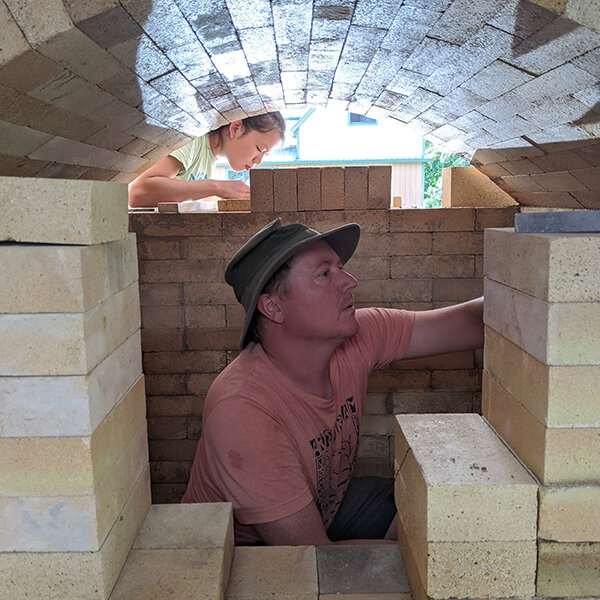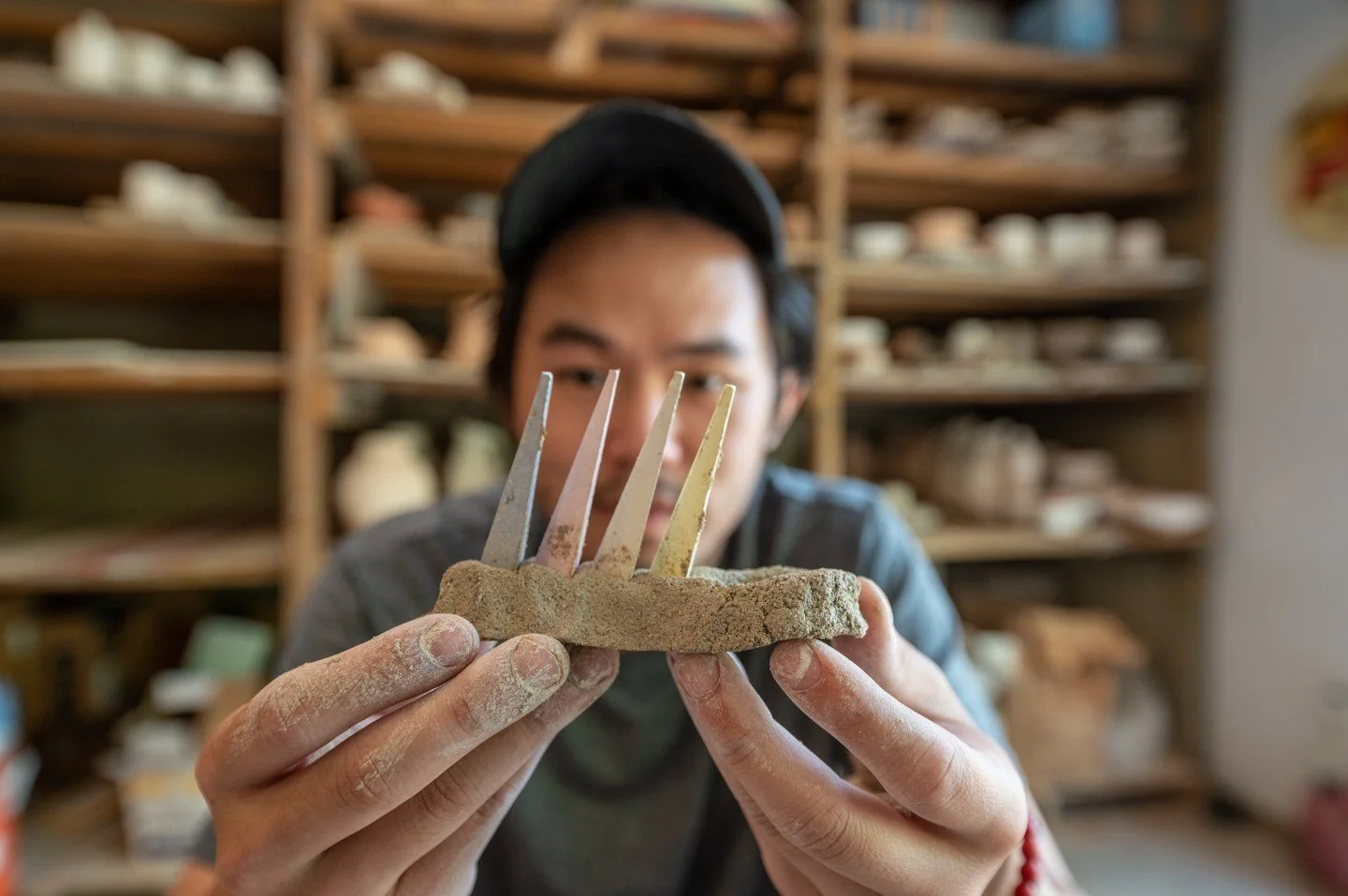
Apprenticeship
Benjamin Carter the host of Tales of a Red Clay Rambler podcast interviewed two of my apprentices in May 2017. Ian Connors and Jacob Meer talk about their own work, plans for the future and experience as an apprentice at Mill Creek Pottery. This interview is part of a three-part series where Ben helped me co-lead a woodfire workshop at my own pottery in Wisconsin. You can listen to Ian and Jacob here, as well as see their work by clicking on the names above.
13 years of apprentices at Mill Creek Pottery. This fun little video celebrates many of the 18 apprentices who have come through the wood-fire pottery program in Gresham, WI
Lars Voltz ends his term at Mill Creek and hands the fire off to new apprentice Ian Connors
In 2004 we started an apprenticeship program at Mill Creek Pottery with the idea of creating a symbiotic experience. In many ways, I designed the program to offer the experience I would have liked to have had when I was trying to find my voice in clay. The apprentices play a vital role in the success of the pottery allowing for more opportunities to travel, create and learn.
As of 2020 I have had the pleasure to work with 21 apprentices, they are:
Kate Kennedy, Daniel Pfohl, Brian Chen, Wu Meng-che, Harrison Levenstein, Jenny Chamberlain, Jacob Meer, Ian Connors, Liz Vukelich, Lars Voltz, Willson Gaul, Kelsie Rudolph, Lucie Brisson, Hannah Meredith, Mike Gesiakowski, Chaio-Feng Shen, Ryan Strobel, Matt Bukrey,Tom Jaszczak, Chris Greenwood, Kenyon Hansen and Domonique Venzant.
Past apprentices have gone on to residencies at the Archie Bray Foundation, Taos Clay, and Greenwich House Pottery. Some have attended graduate programs in ceramics, while others have simply continued in the field. It does not surprise me that the apprentices have remained in ceramics, as a dedication to the field is a requirement of the program.
In exchange for 18 hours a week of labor, I offer facilities, materials, opportunities and guidance. Chores you might be doing any given week include sanding and shipping pottery, moving or splitting wood, lawn care, inventory, photographing and web store updates, or giving tours and explaining the process. Apprentices facilitate the making of my work, but do not make my work.
FACILITIES:
At Mill Creek Pottery we have two locations three distinctly different wood-fired kilns, and an electric kiln. We also have the materials for apprentices to build and fire test kilns. The studio has a kick wheel and an electric wheel for apprentices to use. I prefer to have two apprentices at a time, which allows for more firing possibilities and a small but lively studio community.
MATERIALS:
I order several clay bodies, some are my own recipes while others are commercially available. The apprentices usually use my own clay bodies for their work, but I am open to ordering dry materials if an apprentice wants to test new clays. In many ways, I see Mill Creek Pottery as a woodfire research institute, so testing clays and innovations in kiln design interest me. Of late, I have started to encourage apprentices to publish and I may co-author articles with future apprentices.
OPPORTUNITIES:
In addition to the day in out rhythms often studio potter, I travel and teach workshops, participate in tremendous sales with other potters from around the country. In 2012 apprentices and I traveled to Montana to build a kiln for the Archie Bray Foundation, future kiln building opportunities are already in the works. I have sold work at Demarest (The Art School at Old Church), the St. Croix Pottery Tour which is the most amazing and heartening pottery sale in the U.S., and at the ArtStream trailer at NCECA. The quality and breadth and experience of the other potters at those sales becomes a huge opportunity for networking, critique, and conceptual fodder, not to mention the chance to purchase some of the best pottery in the U.S. Apprentices have assisted my workshops at Penland, Arrowmont and the Archie Bray Foundation.
GUIDANCE:
I believe art pottery is different than craft pottery in that it has a core concept it explores and communicates. My goal is for apprentices to develop their own voice in clay, I expect them to define and clarify not only a voice but a message in their work. This is mostly done by making a lot of work combined with constant critique, suggestions, conversation, and questions. We do schedule formal critiques after firing but it is the daily process that seems more effective. I expect apprentices to be prolific. The second component to the guidance is career-based. An undercurrent of the apprenticeship is to teach methods to promote establish and sustain the life of the full-time artist.
I expect apprentices to invest themselves in the success of Mill Creek Pottery, as I am invested in the success of each apprentice. A sense of ownership and pride of place is an important ingredient to a successful time here. I look for apprentices who are hard-working, thoughtful and open to learning, eager, and respectful. Organizational skills are appreciated.
Please note that I do not provide housing, nor meals. In the past apprentices have rented inexpensive apartments or a room with a local family. Some have held part-time jobs or used saved money as an educational investment to spend more time in the studio. We do host an apprentice sale and there are some opportunities to sell work, but it doesn't amount to a lot of money. People who are interested in an inexpensive studio space to make a lot of work to sell should not apply.
If you are interested in the apprenticeship you should email me and begin the conversation. I ask for a year's commitment with the option to extend. Because the studio space is shared and because apprentices work closely with my family finding a good fit is vital. Living in Ilinois and wood firing is not for everyone, nor is my teaching and work style.
To apply please email me simon@simonlevin.com, with a letter of intent, and 5-10 images of your current work
If you have read this far and you want an interesting current viewpoint, Brian Chen was interviewed on Paul Blais’ podcast.
